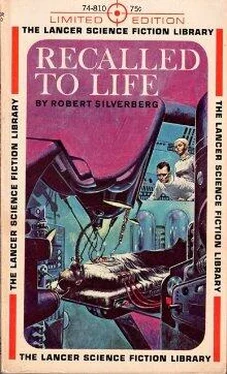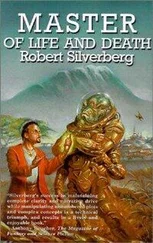He tried to say something affectionate, something to repay her for the suffering he had caused, the lonely evenings, the tense breakfasts.
But she spoke first. “They still haven’t found Senator Thurman, Jim. I heard the nine-thirty newscast. Isn’t it terrible, an old man like that disappearing?”
Sudden coldness swept through him. “Still—haven’t found him?” he repeated inanely. “Well—I guess—ah—that old buzzard’s indestructible. He’ll turn up.”
“How do you think this will affect the hearing on Monday?”
Harker shrugged, only half-listening. He was thinking, You know damn well where Thurman is, and you’re afraid to tell her. Why don’t you speak up? Don’t you trust your own wife? He wet his dry lips. “I—I suppose they’ll choose a new chairman if something’s happened to Thurman. But—”
“Jim, are you all right? You look terrible!”
“Lois, I—want to tell you something. Today—”
He stopped, wondering how to go on. She was staring intently at him, curious but not overly curious, waiting to hear what he had to say.
The phone rang.
Grateful for the interruption, Harker sprang from the couch and darted around back to take the call on the visual set. He activated it; Mart Raymond’s face appeared on the screen.
“Well?” Harker said immediately, in a low voice. “Is the evidence all taken care of? ”
Raymond nodded agitatedly. “Yes. But that’s not what I called about. Barchet’s dead!”
“What? How?”
“It happened about five minutes ago. He was getting ready to leave, and we were discussing—you know, what happened tonight. He had a heart attack and just dropped. It must have been all the excitement. His heart was weak anyway, he once said.”
Harker could not repress the tide of relief that rose in him. Barchet had been the cause of half of his troubles—Mitchison and Klaus, for one, and the Thurman affair for another. Still, a man was dead, and that was no cause for rejoicing, he told himself coldly.
He said, “That’s too bad. Did he have a family?”
“Just a wife, but she died years ago. He was alone.”
Harker nodded. “You’d better notify the local police right away.”
“Jim, what’s the matter with you?” Raymond asked incredulously.
“What do you mean?”
“Barchet’s in the operating room now. Vogel’s getting ready to try a reanimation on him.”
“No!” Harker said instantly.
“No? Jim, we can’t just let him die like that!”
“Barchet was a troublemaker, Mart. He was the weak link in the organization. Now we’re rid of him; let him stay dead. It’s one less witness to the thing that happened today.”
In a shocked whisper Raymond said, “You can’t mean what you’re saying, Jim.”
“I mean exactly what you’re hearing. Barchet was unstable, Mart. He pressured you into doing all sorts of cockeyed things. If he lived, he’d end up revealing the Thurman business before long. Let him stay dead. That’s an order, Mart.”
Raymond seemed to shrink back from the screen. “It’s almost like committing murder, Jim! The man could be saved if we—”
“No,” Marker said, with a firmness he did not feel. “There’ll be trouble if you cross me, Mart. Good night.”
He broke the contact with a shaky hand.
Lois gasped when she saw him. “Jim! It must be bad news. You’re utterly white.”
He sat down heavily. “One of the Beller executives just had a heart attack. A man named Barchet—a runty little fellow who enjoyed sticking lead pipes between the spokes of smoothly running machines. I just ordered Mart Raymond not to attempt reanimation.”
His hands were quivering. Lois took them between hers. Harker said, “It’s like murder, isn’t it? To refuse to reanimate a man, when it’s possible to do so. But it’s better for everyone if Barchet stays dead. Nobody will miss him. God, I feel awful.”
“Remember the McDermott case, Jim?”
He frowned, then smiled at her. “Yes,” he said. McDermott had been a factory hand, an overgrown moron of 22 who had beaten his 70-year-old father to death one night shortly before Harker had become Governor of New York. The verdict had been speedy, the sentence one of execution. With the boy in the death house and the night of the execution at hand, his aged mother had relented, lost her vindictiveness, pleaded with the new Governor Harker to commute the sentence.
The boy had had a long criminal record. The court had found him guilty. He had murdered his father in cold blood, premeditatedly. He deserved the full penalty.
Harker had refused to commute. But then he had spent the rest of the evening staring at his watch, and at the stroke of midnight had burst into an attack of chills.
He nodded slowly now. “I refused to commute Barchet’s sentence. That’s all there is to it.”
The newspapers Saturday morning gave full play to the Thurman disappearance. Several of them ran biographies of the missing senator, tracing his political career from the early founding days of the National-Liberal Party to his present anti-reanimation stand.
The police and FBI statements were simply mechanical handouts, repeats of last night’s assurances that no stone would be left unturned. Harker read them with some amusement. He had slept well, and a good deal of last night’s tension had departed from him.
He had come to a calming conclusion: Raymond and Barchet had done a violent thing, but these were violent times. Somehow he would have to forget about the shocking Thurman affair and continue along the path already entered upon.
The obituary pages contained one item worth note:
SIMEON BARCHET
Simeon Barchet of 210 Princeton Road, Rockville Centre, L.I., treasurer of the Better Research Laboratories, died of a heart attack at the Better office in Litchfield, New Jersey yesterday. His age was 61.
Mr. Barchet joined the organization of the late oil operator D. F. Better in 2014, after serving as a vice-president of the Chase Manhattan Bank. Upon Mr. Belter’s death ten years later, he became a trustee of the Better Fund and participated actively in the operation of the laboratory in Litchfield.
He left no survivors. His wife, the former Elsie Tyler, died in 2029.
Harker felt inward relief. Raymond had not dared to defy him; the reanimation of Barchet had been stopped as he had ordered.
It was only to be expected that some keen-eyed reader would read the Barchet obit and wonder why an official of the Seller Laboratories had been allowed to die on the premises, when reanimation equipment was right there. No doubt the question would be raised in the afternoon papers, since any news of the Beller researchers rated a good play.
He was not mistaken. At noon Mart Raymond called; he stared somewhat reproachfully at Harker out of the screen and said, “Some reporters just phoned up, Jim. They saw Barchet’s obit and want to know how come he wasn’t reanimated. What am I supposed to tell them—the truth?”
Harker scowled. “Don’t tell them anything. Let me think. Ah—yes. Tell them Barchet was despondent over personal affairs, and left a memo imploring us not to reanimate him. Naturally, we abide by his last request.”
“Naturally,” Raymond said acidly. “Okay. I’ll tell them. It sounds halfway plausible, anyway.”
The newspapers moved fast. By nightfall the story had been promoted to the front pages, generally headed with something like BELLER MAN CHOOSES DEATH. The editorial pages of the Star-Post’s evening edition had an interesting comment:
NATURAL DEATH OR SUICIDE?
Yesterday Simeon Barchet, an executive of the now-famous Beller Research Laboratories, died suddenly of a heart attack. According to his colleagues at Beller, Mr. Barchet had been in a despondent frame of mind and left instructions that he was not to be reanimated.
Читать дальше












